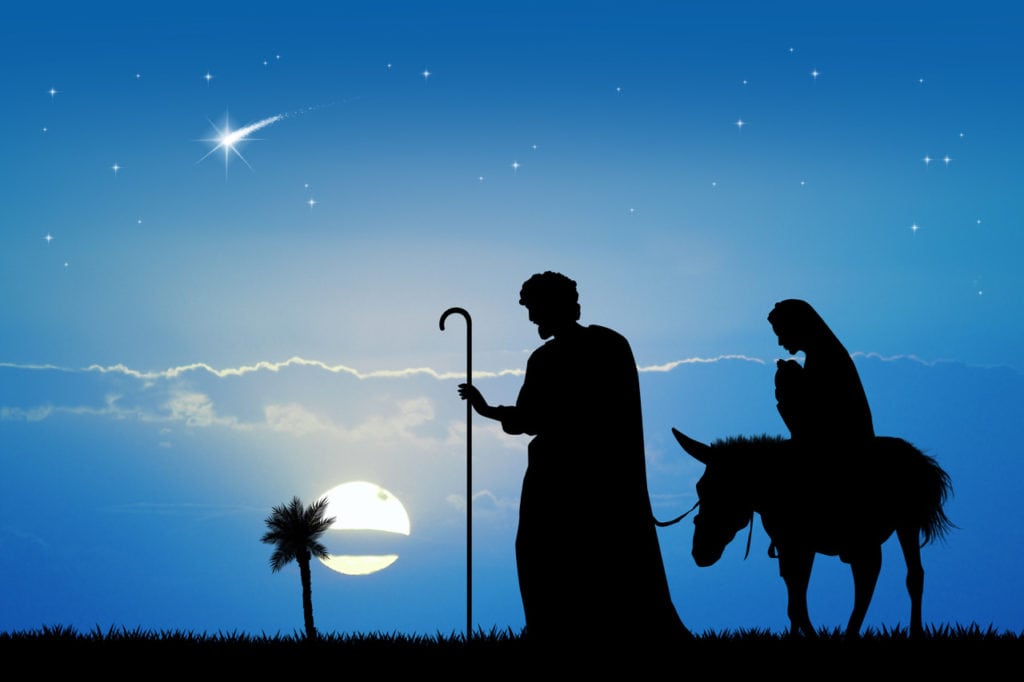filter posts:
Date
We Can Learn From Shepherds
 This is the time of year when you can walk into the mall, or Barnes and Noble, or just about anywhere and hear songs like, “Hark the Herald Angels Sing,” playing for your shopping pleasure. A friend of mine said he sometimes wants to shout out, “Hey! Hey, everybody, do you hear that? Do you understand what that song means?” But sadly, there are some places where you won’t hear songs about Jesus. Dave Barry used to write for the Miami Herald, and this is how he started one of his columns around Christmas time: “To avoid offending anybody, the school dropped religion altogether and started singing about the weather. At my son’s school, they now hold the winter program in February and sing increasingly non-memorable songs such as ‘Winter Wonderland,’ ‘Frosty the Snowman’ and — this is a real song — ‘Suzy Snowflake,’ all of which is pretty funny because we live in Miami. A visitor from another planet would assume that the children belonged to the Church of Meteorology.”
This is the time of year when you can walk into the mall, or Barnes and Noble, or just about anywhere and hear songs like, “Hark the Herald Angels Sing,” playing for your shopping pleasure. A friend of mine said he sometimes wants to shout out, “Hey! Hey, everybody, do you hear that? Do you understand what that song means?” But sadly, there are some places where you won’t hear songs about Jesus. Dave Barry used to write for the Miami Herald, and this is how he started one of his columns around Christmas time: “To avoid offending anybody, the school dropped religion altogether and started singing about the weather. At my son’s school, they now hold the winter program in February and sing increasingly non-memorable songs such as ‘Winter Wonderland,’ ‘Frosty the Snowman’ and — this is a real song — ‘Suzy Snowflake,’ all of which is pretty funny because we live in Miami. A visitor from another planet would assume that the children belonged to the Church of Meteorology.”
“Hark the Herald Angels Sing” is not about the weather. The first verse ends with this: “glory to the newborn king.” Question: To whom were the angels heralding this amazing news, the news of a king being born? The shepherds, of course! And where were the shepherds? Another Christmas song tells us: “The first Noel, the angel did say, was to certain poor shepherds in fields as they lay.” Why were they lying around in fields? The song, and the Bible, tells us: because they were keeping their sheep.
There were some famous shepherds in the Old Testament, the greatest being David, shepherd-boy turned King of Israel. At the time when Jesus was born, however, shepherds were scorned and despised. Ironically, the first people besides Joseph and Mary to see the Savior with their own eyes, the shepherds, did not have legal standing in those days to give testimony in a courtroom that they had seen the Savior with their own eyes. That didn’t matter to God.
What can we learn from the shepherds? Plenty, but here’s one thing: they obeyed the Good News. The shepherds said to one another, “Let us go over to Bethlehem and see this thing that has happened, which the Lord has made known to us.” Notice first that their obedience was corporate, and that’s a great thing. The shepherds went together, encouraging one another to obey the Lord. If you are hanging out with people who make a habit of obeying the Lord, and encouraging you to obey the Lord, you are hanging out with good people. Second, their obedience was immediate. “And they went with haste.” They hurried to obey God. There were lots of reasons to delay: as many sheep as there were, those were each a reason. We are not told what they did with the sheep. Maybe the angels told them that they could leave the sheep in the field and they would be fine. Maybe they found some substitute shepherds who were off that day. Maybe they just looked at the sheep, looked at each other, and called out, “Good luck Fluffies!” as they hurried off. Probably not, they were shepherds, which means they were first and foremost protectors of sheep. But God had spoken to them through a heavenly host, an army of angels. And it was with great joy that they obeyed God with abandon!
There is delight and surprise waiting for those who will make haste and obey God’s command. Third, their obedience was grounded. They said, “Let’s go see this thing which the Lord has made known to us.” They did not hesitate to obey because they had heard the very Word of God. Finally, their obedience was rewarded. “And they went with haste and found Mary and Joseph, and the baby lying in the manger.” Seeking the Lord will lead to finding the Lord. God always rewards obedience. Always!
May God bless you and yours this Christmas with hearts fully yielded to Him.
December 27, 2017
This Was the Greatest Gift Of All
 Addison Leach used to talk about a father and young son, playing ball together. Dad helps him learn to cup his hands, and hold them together, and gently encourages his son as he tosses him the ball underhanded. All of a sudden, the little boy drops the ball, which rolls down the lawn and into the busy street. Acting impulsively, as three year olds are prone to do, the little boy runs to get it. He is about to step into the street in front of a car when the father races down, using all of his energy and strength, and at the last possible second, grabs his son, and pulls him to safety. That father has actually displayed two kinds of being. First, he has condescended to live on the boy’s level, play ball at the boy’s speed, act as he acts, for the purpose of fellowship with his son. Second, for the purpose of saving his son, he exerts everything he has to pull him out of danger.
Addison Leach used to talk about a father and young son, playing ball together. Dad helps him learn to cup his hands, and hold them together, and gently encourages his son as he tosses him the ball underhanded. All of a sudden, the little boy drops the ball, which rolls down the lawn and into the busy street. Acting impulsively, as three year olds are prone to do, the little boy runs to get it. He is about to step into the street in front of a car when the father races down, using all of his energy and strength, and at the last possible second, grabs his son, and pulls him to safety. That father has actually displayed two kinds of being. First, he has condescended to live on the boy’s level, play ball at the boy’s speed, act as he acts, for the purpose of fellowship with his son. Second, for the purpose of saving his son, he exerts everything he has to pull him out of danger.
That’s the story of the incarnation, when Jesus “emptied himself by taking the form of a servant, being born in the likeness of men.” Eternal God condescended to live as a man. Every now and then, we saw the eternal attributes of God displayed in Jesus. Like the time when Jesus was asleep in the boat with His disciples during a raging storm on the Sea of Galilee. He was asleep because he was tired. The disciples awakened Jesus, afraid for their lives. He arose and rebuked the winds and the sea, and they immediately died down. What is this? Tired yet omnipotent! Here Jesus’ human nature completely hid his mighty power until that omnipotence broke forth with a sovereign Word from the Lord of heaven and earth.
In order to submit to his Father’s will and save sinners like you and me, Jesus had to become a man himself. Years ago my brothers and I used to set out rabbit gums, wooden boxes with a trap door; the animal would smell the bait, enter the box, hit a stick that was connected to the door and the trap would slam shut. Every morning before school I would run down in the woods and check my traps. I caught exactly one rabbit in all those years. They’re just too smart. I caught dozens of possums because, well, they’re not known for their brainery. Why do you think there’s so much free possum meat on the road? Let’s suppose my heart goes out to these poor critters and I decide to act in order to save the possums. I figure the only way to save the whole possum race is to become one. I somehow add to my human essence the essence of possum (you won’t find that fragrance at Belks), and I come in the likeness of a possum. I travel down, way down to possum land, where those critters live. I would probably find most of them waiting by the side of the road, watching for cars to come so they can run out in front of them. And I would go to them and speak possum to them, pleading with them to change their ways. Of course, in keeping with the truth of the Gospel, I would have to offer my life as a perfect sacrifice for them.
Look, even if I could become a possum, I wouldn’t want to. But listen, friends. However great the distance from manhood to possumhood might be, it cannot compare to God taking on human flesh in the person of Jesus Christ. He came to die so that you and I might live. There is no greater Christmas present than that.
Have you received that gift yet?
December 18, 2017
Joseph Was a Thoughtful Man
 Joseph decided to quietly divorce Mary when he found out she was carrying a baby that was not his. That alone puts in him a league virtually by himself, as he wanted to protect, rather than expose, the woman who had seemed to betray him. Then he did the unthinkable. He thought about what he was about to do. What would have happened to Mary had she been betrothed to an impulsive man? An angry man? A man who shoots first and asks questions later? A man who can always be counted on to blow up at the least provocation so that everyone around him walks on eggshells? God chose the man who would be the father to Jesus on the earth, and He chose Joseph. Here’s a lesson learned from this man’s character: thought should always precede action.
Joseph decided to quietly divorce Mary when he found out she was carrying a baby that was not his. That alone puts in him a league virtually by himself, as he wanted to protect, rather than expose, the woman who had seemed to betray him. Then he did the unthinkable. He thought about what he was about to do. What would have happened to Mary had she been betrothed to an impulsive man? An angry man? A man who shoots first and asks questions later? A man who can always be counted on to blow up at the least provocation so that everyone around him walks on eggshells? God chose the man who would be the father to Jesus on the earth, and He chose Joseph. Here’s a lesson learned from this man’s character: thought should always precede action.
It was while Joseph thought about the events that were unfolding around him that an angel of the Lord appeared to him in a dream. His thoughtfulness reveals a wisdom that Joseph had even as a young man. Someone said wisdom is the reward you get for a lifetime of listening when you would have preferred to talk. Perhaps we could say that wisdom is also the reward you get for developing the habit of waiting when you are not sure what to do.
The fact that Joseph got the answer in a dream tells me something else. Joseph did not make an impulsive decision about his betrothal to Mary. He slept on it, first. How many decisions have we made in the heat of the moment that had we just waited 24 hours would have saved us untold misery? I heard about a zoo in Friedberg, Germany that decided, (ready for this?) that they are no longer going to allow children to swim with crocodiles. Good call, folks! It seems that at birthday parties, the children could feed, touch, and even swim with crocodiles, as long as they were with an experienced guide. Wow. Some decisions you don’t need to sleep on, and that one falls into the “What took you so long?” category.
Maybe none of us are going to swim with crocodiles. We are much more likely to take other risks, like racking up large amounts of debt on our credit cards. Last year the average American family spent nearly $1,000 on Christmas presents, which doesn’t include what they spent on decorations, food, and trips to see grandma’s house. Most Christmas spending is put on a credit card. If you make the minimum payment on the card, it will take more than five years to pay off the debt for one Christmas, and you will end up paying an additional $500 in interest. Hey, probably the best thing we all could do for our financial health would be to pay cash for presents this year.
Joseph was a thoughtful man who listened to and followed God. God spoke to Joseph about staying in the betrothal and not running away from what would have been a scandal to the community. That is what love looks like: to suffer humiliation quietly for the Lord’s name. Then, God spoke to Joseph in a dream to tell him to take the child and His mother to Egypt, to protect them from Herod. Here’s another definition of love: to put myself in an uncomfortable place for the sake of Christ. Finally, God spoke to Joseph when Herod was dead to say it was safe to go back to Israel.
I can hear you say, “Well, hey, if an angel of the Lord appears to me in a dream and tells me what to do, I will gladly do it!” But that would be missing the point. The point is that in each case, Joseph heard from God. We can do that without angels and without dreams, can’t we? Joseph put himself in position to hear from God by being a thoughtful and just man, and by obeying what God said. We can do the same thing by being daily in the Word, weekly in fellowship with the church, and moment-by-moment being dependent on the Holy Spirit’s help and guidance.
December 11, 2017
We Have Good News to Tell
 Cindy and I enjoy reading through books together. At least a few evenings a week, we will curl up with a hot drink in the den and read a chapter or two. The book we are currently enjoying is “The Insanity of God” by Nik Ripken. You really should read this book, if for no other reason than to understand the title. Let me warn you, though. There are stories that will make you laugh out loud, and stories that will make you sob. Out loud. Let me share one of Nik’s lighter stories that took place before he and his wife went overseas for the first time.
Cindy and I enjoy reading through books together. At least a few evenings a week, we will curl up with a hot drink in the den and read a chapter or two. The book we are currently enjoying is “The Insanity of God” by Nik Ripken. You really should read this book, if for no other reason than to understand the title. Let me warn you, though. There are stories that will make you laugh out loud, and stories that will make you sob. Out loud. Let me share one of Nik’s lighter stories that took place before he and his wife went overseas for the first time.
They had spent months filling out paperwork and answering questions about their desire to serve as missionaries. Finally Nik and his wife got to answer questions in person. The board asked why they were interested in missions, and Nik’s wife told them about feeling called to missions even as a child. The board was impressed. Then they turned to Nik and asked when he had “received the call.” He said, “I read Matthew 28.” That’s where Jesus gave the disciples the Great Commission, commanding them to go and make disciples of all nations, of all people groups. The board was not impressed, and they spent an hour explaining how overseas missions is “supposed to work.” They told Nik that it requires first a call to salvation and then a call to ministry and then a call to take the Gospel out into the world and finally a call to go to a specific country. They asked him then what he thought about that, and he wrote in the book that he was young and naïve enough to believe they really wanted to know what he thought. He said, “It appears to me that you have created a ‘call to missions’ that allows people to be disobedient to what Jesus has already commanded all of us to do.”
I love that story because it has so many applications. We Christians sometimes like to hide behind the fog of ‘feeling a call’ as an excuse not to do the plain things the Lord has commanded us to do. “Well, you know, I would have people over to my house for a meal,” someone says, “but I just don’t feel called to do that. It’s not my gift.” You don’t have to read much in the Bible to see that God’s people are commanded to exercise hospitality.
Someone else says, “I don’t go to church very often. It’s just not my thing.” If church is not your thing, you should reconsider whether Jesus is. It makes no sense to say that you love the head while you are indifferent to the body.
Another person says, “Well, I don’t know much about what the Bible says, but I don’t need to; the pastor (Priest? Father? Bishop?) is supposed to read that stuff and tell the rest of us what it means.” That kind of thinking led to the Reformation.
The classic example is when a Christian says, “Tell people about Jesus? What do you take me for, a fanatic? Besides, that’s not my calling. I’m not good at it. Other people can do that, but not me!” Read Matthew 28. In fact, dive in and read the whole Gospel, any of the four, and see what Jesus trained his first disciples to be and to do.
Then, go practice sharing the good news. Tis’ the season, after all, and hearts are more open to hear at this time of year the reason we celebrate Christmas.
December 4, 2017
